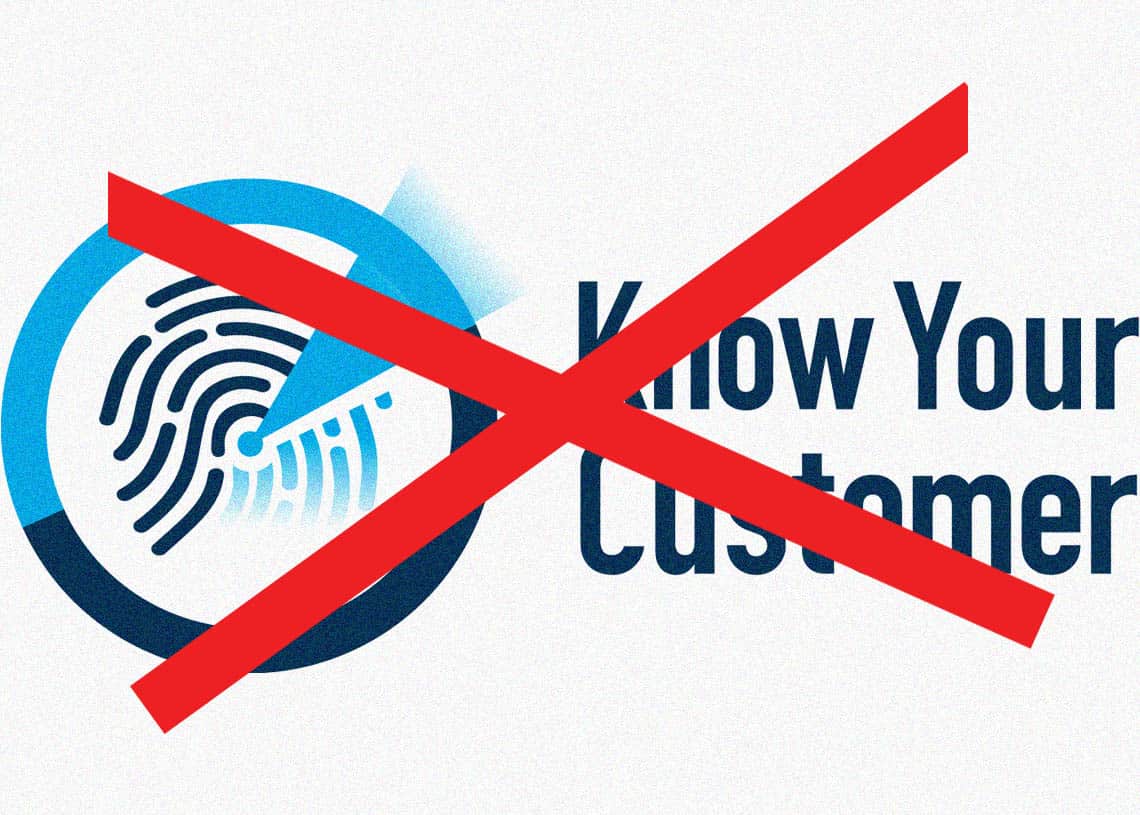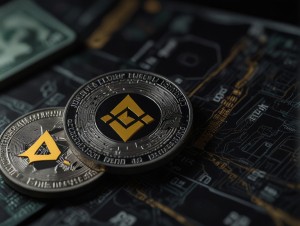This article explores a list of KYC free crypto exchanges, exploring the reasons and challenges of trading on such platforms. For starters, the privacy comes with investing your funds discreetly. However, it also poses legal considerations that come with prioritizing anonymity.
Cryptocurrencies bring an allure of privacy and seamless transactions. In the early days of crypto, they were the perfect fit for paying for services and goods, including drugs, on the dark web. The notoriety and popularity of cryptocurrencies then contributed to their value growth. The privacy and uncensored nature of a cryptocurrency were also factors that the pseudonymous Satoshi Nakamoto vouched for.
I’ve always been fascinated by the delicate balance between privacy and security in digital finance. This curiosity drives me to explore KYC free crypto exchanges, platforms promising anonymity and ease of access that conventional exchanges cannot provide.
Here is a concern that I have with KYC free crypto centralized exchanges. While KYC-free trading is enticing, it does not prevent the exchange from freezing your account and requesting verification documents. The exchanges employ automated risk control algorithms that flag accounts on suspicion of malicious activity. Users have reported unwarranted account freezing. I read a review once: ‘This is bait and switch. They let you deposit without KYC but require it when you want to withdraw.’
Benefits of using KYC free crypto exchanges
Know Your Customer (KYC) procedures are known to be rigorous and time-consuming. Sometimes, they are used to screen users from specific regions from engaging with a platform. I have experienced regulatory measures that prevent you from signing up on a platform firsthand. So, what are the benefits of using KYC-free exchanges?
Enhanced Privacy:
KYC fee exchanges are privacy-oriented. Our era has faced challenges ensuring user privacy, forcing multiple countries to draft and enforce privacy laws. For privacy-conscious individuals like myself, this aspect is not just a convenience but a necessity. KYC-free exchanges do not take your details, meaning they cannot compromise your personal information and safeguard you from potential data breaches and identity theft.
Quick and Easy Access:
KYC processes can be time-consuming; the lack thereof means a quick and hassle-free trading experience. It allows you to seize market opportunities the moment they arise without being bogged down by paperwork. It is a feature that I have found incredibly useful.
Inclusivity:
KYC-free exchanges remove limitations on who can operate on their platform. This means bringing banking services to the unbanked, especially in regions with limited access to traditional banking systems and stringent financial regulations. It democratizes access to the crypto market, therefore broadening the cryptocurrency community. These diverse communities bring diverse perspectives, fostering inclusivity and innovation.
Autonomy Over Personal Data:
Using KYC-free exchanges empowers you with greater control over your data. You can choose the level of anonymity by deciding on who you share information with. Never share login details or multi-factor authentication credentials with anyone for security purposes.
Potentially Lower Costs:
The exchanges do not have to invest in managing and verifying user documentation. They can free up resources that can be used to provide a better user experience, such as lower transaction fees. Such features can go a long way in increasing your profit margins.
Risks and downsides
KYC free crypto exchanges, however, have their fair share of challenges. My journey through the cryptocurrency market has taught me that understanding these pitfalls is essential for anyone considering KYC-free exchanges as their trading platform.
Enhanced Risk of Fraud and Scams:
The privacy and anonymity that democratizes access to crypto markets also attract fraudsters and scammers. The exchanges cannot weed out bad actors since they have no idea who engages with their platform. The platforms, therefore, are riskier than their counterparts; remember, the anonymity that shields you also conceals bad actors.
Limited Recourse in Case of Disputes:
There is little recourse in determining its authenticity in the case of trading disputes. Imagine losing access to your account, and you have to prove you are the actual owner. Or a trader made a chargeback after a trade, and you must trace them to raise a dispute. Even a responsive customer care agent cannot help you.
Regulatory Risks:
KYC free crypto exchanges are being scrutinized globally as regulatory measures continue to evolve. The measures call for strict KYC and anti-money laundering (AML) measures by every cryptocurrency exchange. There is a risk that your favorite KYC-free exchange will be outrightly banned or shut down by regulators. Read up on the crypto regulatory landscape in your jurisdiction to avoid any legal recourse.
Lack of Insurance and Lower Security Standards:
The exchanges are often unregulated and do not offer insurance on your funds. In the event of a hack or technicality, you may lose your funds. The platforms also have a higher risk of cyber attacks due to the lack of standardization. Stay safe, use secure wallets, and practice safe trading habits to prevent losses.
How to Choose a KYC Free crypto Exchanges
Choosing the best KYC free crypto exchanges can be daunting, especially for beginners. Here are factors to consider and tips for navigating these privacy-oriented platforms.
Security Measures:
The security risks posed by KYC free crypto exchanges are wanting. Security must be your priority. Research how the platform ensures the security of your funds. Your checklist should include encryption of user data, cold storage of funds, withdrawal whitelists, and multi-factor authentication. Browse for the platform’s reviews and feedback posted by its users. Also, research how the platform could resolve previous security breaches.
Liquidity:
Liquidity is crucial, especially when dealing with high-volume trades. You may want to know whether the platform can fulfill your order at market price. Low liquidity can result in slippage and losses by closing your order at an unpreferable price. Review the platform’s trading volume and spread across buy and sell orders.
Transaction Fees:
Transaction fees directly impact your profitability. Choose an exchange with low or competitive rates, especially if you are a frequent trader. Also, be wary of hidden charges such as withdrawal or deposit limits and charges.
User Interface:
Your exchange of choice should provide a smooth trading experience and an intuitive user interface. The UI should be friendly, and the numbers visible.
Customer Support:
Great customer support means fast resolution of disputes. The exchange should provide 24/7 customer support and not just AI chatbots. A responsive support team can be invaluable, especially in fast-moving market conditions or if technical issues arise.
Tips for Maintaining Security and Privacy
Use VPNs:
A Virtual Private Network (VPN) encrypts your internet connection and masks your IP address; a VPN helps protect your trading activities from prying eyes and reduces the risk of data interception.
Secure Wallets:
Only deposit your trading funds in the exchange. A chunk of your crypto should remain in hardware wallers. Such wallets are offline, therefore, immune to online hacking attempts.
Two-factor authentication (2FA):
Enable two-factor authentication (2FA) or any other security measures the exchange recommends. 2FA, for instance, adds a layer of security by requiring a second verification form before allowing access to your account or confirming transactions.
Top KYC free crypto exchanges
MEXC
You can trade on MEXC without KYC you just have to verify your phone number and email address. However, your account will only give you limited trading features and a 30BTC daily withdrawal limit. There are two levels of KYC on MEXC: primary and advanced. Primary KYC increases your daily withdrawal limit to 80 BTC but with limited access to P2P transactions. Advanced KYC will give you a 200 BTC daily withdrawal limit, unlimited P2P access, global bank transfer, and a debit/credit card.
MEXC is the largest and most popular centralized exchange you can trade without KYC. Its features include
- Zero maker and taker fees.
- High-performance engine – 1.4 million transactions a second.
- Available in 170+ countries
- 1000+ listed cryptocurrencies
- Multi-factor authentication.
- High liquidity- ranked #11 on Coinmarketcap
Changelly
Once you sign up on Changelly, you can trade without completing KYC procedures but with withdrawal limits. You can withdraw a maximum of 1 BTC equivalent daily and 5 BTC monthly. However, if their automatic surveillance systems raise a flag on your account, you must submit your verification documents. To increase your account limits, you have to complete KYC.
Changelly is one of the oldest crypto exchanges in the market, founded in 2015. Its key features:
- 500+ listed cryptocurrencies
- High-performance trading engine
- Changelly does not store crypto. Instead, they are sent to your wallet for security after the exchange.
- Apart from the exchange, Changelly offers services like Changelly Buy, Changelly Sell, Changelly DeFi Swap, Changelly PRO, Changelly Earn, and Changelly API.
BingX
BingX is the most comprehensive non-KYC trading platform regarding trading features and functionality. The best for day traders. Like Changelly, non-KYC trading limits your withdrawal limit to 50,000 USDT daily. Verified users can withdraw up to 5,000,000 USDT. The KYC process on BingX takes one working day to process.
BingX was established in 2018 and offers various services, including
- Over 700 listed cryptocurrencies with leverage of up to 150x.
- Comprehensive copy trading feature comprising 15000+ elite traders.
- Grid trading allows you to create your trading strategy and profit 24/7.
- Robust security features, including 2FA Authentication, auto-detection of cybercrime-related risks, and security audits approved by leading security-focused ranking platforms.
Phemex
You don’t require KYC to start trading on Phemex; however, that comes with limitations. You cannot access premium membership and bonuses such as zero trading fees, quiz vouchers, and copy trading. The platform advises KYC on a smooth trading experience. Basic KYC qualifies you for a daily withdrawal limit of $2,000 and an advanced KYC withdrawal limit of $2 million.
Phemex was established in 2019, and its headquarters are in Singapore. Its notable features include
- Spot and leverage trading.
- 250+ listed cryptocurrencies
- Intuitive trading interface
- Welcome rewards worth up to $8800.
- Buy crypto with a debit or credit card or deposit fiat currencies.
Probit
You can start trading cryptocurrencies on ProBit with email verification only with a daily withdrawal limit of $5,000. Accounts with full KYC have a daily withdrawal limit of $500,000 and have access to Initial Exchange Offerings (IEOs).
ProBit is a cryptocurrency exchange founded in 2018 and headquartered in Seychelles. Its notable features include
- Supports FIDO security keys and software-based 2FA for secure user login.
- 95% of ProBit Global digital assets are stored in cold wallets
- 800+ listed cryptocurrencies
- Fiat on-ramp support is available for over 50 currencies.
CoinEx
The CoinEx KYC policy limits the 24-hour withdrawal limit to $10,000 and promotional events to users who have not verified their accounts. Verified accounts can withdraw up to $1,000,000 a day. KYC will be required to transact private coins such as Monero and change account settings. The platform’s services are unavailable in China, the United States, and Alberta, Canada.
CoinEx is based in Hong Kong, its main features include:
- 900+ listed cryptocurrencies.
- The engine can support up to 10,000 transactions per second.
- It provides multi-dimensional security and protection for your assets with an additional level of reassurance with its Shield Fund.
- Available in 200 countries and regions.
- Spot and margin trading.
ChangeNOW
ChangeNOW is a KYC-free exchange that stands out since it does not provide any restrictions to traders. However, to stay compliant, they might freeze your transaction and request verification documents to ensure its legality. ChangeNOW has partnered with a KYC provider called SumSub, to handle the verifications, a process that can take up to 3 days. If you don’t want to pass KYC, you can send them a request, and you will receive your refund.
ChangeNOW is a non-custodial crypto exchange, meaning they don’t hold your crypto. Its notable features include:
- 900+ listed cryptocurrencies
- A guarantee for best rates for clients.
- Transaction takes at most 5 minutes to complete.
- You buy crypto as low as $2, with no upper limit.
- Using your Visa or MasterCard, you can purchase listed crypto assets with fiat money.
- The exchange respects your privacy and doesn’t control your funds.
Decentralized Exchanges
Decentralized exchanges (DEXs) play a pivotal role in the ecosystem of KYC-free trading. Unlike centralized exchanges, the platforms operate on the blockchain, enabling peer-to-peer transactions without intermediaries. DEXs inherit the properties of the blockchain and, therefore, cannot be censored. To link to a DEX, you only need to connect your wallet, ensuring complete privacy.
The platforms are KYC-free as they minimize the amount of personal data at risk of exposure or misuse. Popular decentralized exchanges include
- Uniswap: Best Non-custodial DEX, the most popular Ethereum DEX with over $6 billion of total value locked (TVL).
- dYdX: Best No-KYC perpetual exchange
- Pancakeswap- Low fees crypto exchange without ID, DEX on the BNB Smart Chain with over $2 billion in TVL.
- Bitget Wallet – Best non-custodial multi-chain wallet and no KYC exchange.
Conclusion
Navigating the world of KYC-free exchanges offers a unique blend of privacy, speed, and accessibility, catering to a wide range of traders seeking autonomy over their personal data and trading activities. Throughout this exploration, we’ve delved into the benefits and risks, outlined the crucial factors for selecting the right platform, and highlighted the evolving role of decentralized exchanges in this landscape. As the cryptocurrency market continues to evolve, the importance of making informed decisions cannot be overstated. Armed with knowledge and a clear understanding of both the opportunities and challenges, traders can leverage KYC-free exchanges to participate in the digital economy with confidence while still prioritizing security and compliance within this dynamic and often unpredictable domain.





